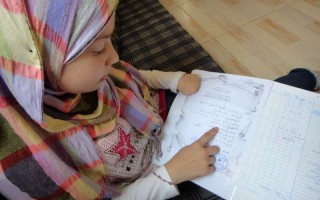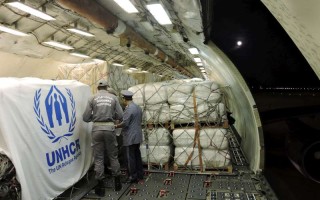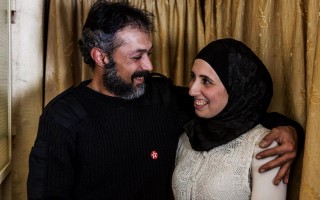One dead and more than 11,000 affected by days of heavy rain and high winds from Storm Norma, with hundreds of refugees forced to abandon their homes.
By Edith Champagne and Houssam Hariri in Bekaa Valley, Lebanon
Syrian refugee Juriya Ramadan wades through the murky, ankle-deep water that inundated her shelter in Lebanon’s Bekaa Valley three nights ago, carrying her barefooted son across the freezing deluge.
She puts him down on a plywood platform balanced above the water line, before wrapping him in a blanket and surveying the damage.
“People are sick. Everywhere there is water. We cannot sleep at night. It has been three days like this. All night we sit and watch the kids and we cannot do anything for them. Their situation is very bad,” the 34-year-old from Deir Ez-Zor explained.
A wood-burning stove – cold and useless with no dry fuel to be found – protrudes like an island from the brown sea of water in the shelter’s main room. Juriya splashes around picking up floating bits of waterlogged wood and piles them on the stove, seemingly for want of anything better to do.
“People are sick. Everywhere there is water. We cannot sleep at night.”
Several days of high winds and heavy rain brought by Storm Norma have led to flooding in towns and villages across Lebanon, which is host to nearly 950,000 Syrian refugees. More than 360 sites hosting 11,300 refugees have been affected, with a number of settlements including in Dalhamiya where Juriya lives becoming completely flooded, forcing hundreds of Syrians from their homes.
At least 600 Syrian refugees in the Bekaa had to relocate because of heavy floods or damage to their shelters. Tragically, the body of a young Syrian girl who drowned after falling into a flooded stream in the north of the country was recovered on Wednesday, after she was reported missing the previous day.
In coordination with Lebanese authorities, UNHCR – the UN Refugee Agency – and NGO partners have sent teams out to assess the damage and distribute emergency relief items including new mattresses and blankets to the worst-affected.
Across Lebanon, UNHCR is assisting 166,000 vulnerable Syrian refugee families and more than two thousand non-Syrian refugee families – mainly Iraqi – as part of its US$180 million regional winter assistance programme.
Support includes distributions of plastic sheeting and wooden poles to help refugees protect their shelters from the elements, as well as a monthly payment of US$75 per family for five months, totaling US$375, to help families cover additional expenses during winter such as fuel for heating, medicine, and clothes.
Across the region, UNHCR has been working for months to help those in need prepare for the harsh winter conditions. Almost 2.5 million vulnerable Syrian and Iraqi refugees and internally displaced people have so far received assistance, chiefly in the form of winter cash payments, shelter materials and thermal blankets and other core relief items.
In total, the response plan aims to reach 3.5 million people across the region with assistance, and also includes measures to mitigate the impacts of extreme weather events.
Ahead of the recent storms in Lebanon, for example, UNHCR pre-positioned stocks of emergency items and sent out SMS messages to refugees living in the Bekaa Valley, warning them of the potential for flooding and advising them what to do if their shelters sustained damage.
The intensity of the storm and the makeshift nature of refugee settlements in Lebanon – which are not capable of sustaining extreme weather conditions for long – meant that many refugees were still hit hard, triggering UNHCR’s pre-positioned emergency capacity.
“There is no doubt that the situation is very difficult,” said UNHCR External Relations Associate Hiba Fares. “We’ve been going around checking on families and trying to help as much as we can.”
“We’ve been going around checking on families and trying to help as much as we can.”
“Some people had their tents torn or broken. Other people had their tents flooded. So we are also trying to provide alternative shelters with the help of our partners for families whose tents have been destroyed,” she added.
Throughout Dalhamiya settlement, residents worked to unblock drains and shift the sewage-tainted water that has formed canals in the narrow alleyways between the rows of tent-like structures. But makeshift drainage and the settlement’s location below the level of surrounding roads have made the task next to impossible.
Looking bereft and exhausted, 60-year-old refugee Amina Al Darak slumps down onto a damp mattress perched just centimetres above the standing water that has filled every corner of her home.
“We’ve never experienced such a situation before,” she said. “The mattresses and the duvets got wet, we didn’t sleep all night. I had to put blankets on wooden boards and lie there. I can’t even make myself a cup of tea because of the flooding.”
Originally published by UNHCR on 11, January 2019
DONATE TO THE WINTER REFUGEE EMERGENCY





